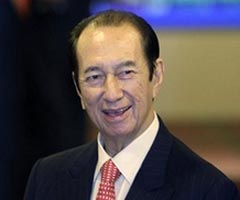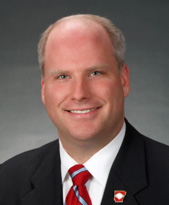 VIP junket operators are coming to Singapore, J.P. Morgan stock analysts reported. Actually, they’re already there in the form of “shadow junkets,” according to Singaporean media. And if Las Vegas Sands or Genting Berhad are knowingly dealing with illegal junketeers, they deserve to have the book hurled at them by the nation’s government. However, a Singapore casino concession is so difficult to obtain (and costly to develop), one would expect Sands and Genting to be accordingly circumspect. The latter already had a near-death experience when it tried to cozy up with Stanley Ho (above), of whom the local government wanted no part whatsoever.
VIP junket operators are coming to Singapore, J.P. Morgan stock analysts reported. Actually, they’re already there in the form of “shadow junkets,” according to Singaporean media. And if Las Vegas Sands or Genting Berhad are knowingly dealing with illegal junketeers, they deserve to have the book hurled at them by the nation’s government. However, a Singapore casino concession is so difficult to obtain (and costly to develop), one would expect Sands and Genting to be accordingly circumspect. The latter already had a near-death experience when it tried to cozy up with Stanley Ho (above), of whom the local government wanted no part whatsoever.
 By virtue of having been earliest to open, Genting’s Resorts World Sentosa (left) had its junketeers vetted first. Of 14 applications, only two made the grade and received one-year licenses (indicative of the short leash upon which one does business on the shores of the Johore Strait). Singapore bureaucrat Lau Peet Meng tried to prettify junket operators’ image by renaming them “International Market Agents,” which sounds more respectable than catchy. They’ll be barred from recruiting local high rollers — which would seem rather beside the point anyway. Singapore’s VIP biz ($3 billion) is already one-eight the size of Macao‘s, so one can hardly imagine its growth now that junkets are — slowly — entering the market. Although the approvals actually came sooner than expected, Sheldon Adelson will have to practice patience as the government sifts through additional Sentosa applications before turning its attention to Marina Bay Sands‘ paperwork.
By virtue of having been earliest to open, Genting’s Resorts World Sentosa (left) had its junketeers vetted first. Of 14 applications, only two made the grade and received one-year licenses (indicative of the short leash upon which one does business on the shores of the Johore Strait). Singapore bureaucrat Lau Peet Meng tried to prettify junket operators’ image by renaming them “International Market Agents,” which sounds more respectable than catchy. They’ll be barred from recruiting local high rollers — which would seem rather beside the point anyway. Singapore’s VIP biz ($3 billion) is already one-eight the size of Macao‘s, so one can hardly imagine its growth now that junkets are — slowly — entering the market. Although the approvals actually came sooner than expected, Sheldon Adelson will have to practice patience as the government sifts through additional Sentosa applications before turning its attention to Marina Bay Sands‘ paperwork.
 Elsewhere in Genting’s portfolio, it made a totally unsurprising decision: Its planned Miami resort will be downsized from the $3.8 billion white elephant previously on the drawing board (right). Genting has too much skin in the game to withdraw, casino or not, having purchased 30 waterfront acres. Besides, if the Florida Lege ever reverses its stance on Vegas-style casinos, a completed Genting hotel constitutes a valuable marker while vacant, undeveloped land would cause the Malaysian firm to lose whatever friends it has in Tallahassee. The new plan — two or three towers atop a podium level — sounds like a casino-hotel manqué. I mean, Genting’s not trying to fool anyone as to its endgame. Retaining the existing Omni Center hotel and operating it under the Genting banner also potentially enables the company to salvage some immediate cash flow from its busted power play. However, with two-thirds of Miami condos built in the last decade having been converted to apartments, Genting’s inclusion of a condo component in its new plan is a head-scratcher.
Elsewhere in Genting’s portfolio, it made a totally unsurprising decision: Its planned Miami resort will be downsized from the $3.8 billion white elephant previously on the drawing board (right). Genting has too much skin in the game to withdraw, casino or not, having purchased 30 waterfront acres. Besides, if the Florida Lege ever reverses its stance on Vegas-style casinos, a completed Genting hotel constitutes a valuable marker while vacant, undeveloped land would cause the Malaysian firm to lose whatever friends it has in Tallahassee. The new plan — two or three towers atop a podium level — sounds like a casino-hotel manqué. I mean, Genting’s not trying to fool anyone as to its endgame. Retaining the existing Omni Center hotel and operating it under the Genting banner also potentially enables the company to salvage some immediate cash flow from its busted power play. However, with two-thirds of Miami condos built in the last decade having been converted to apartments, Genting’s inclusion of a condo component in its new plan is a head-scratcher.
 Eating crow, happily. Having pronouncement Colorado‘s struggling casino industry “over the hill,” it is incumbent upon me to note that February revenues (+6%) showed both sequential and year/year increases. The numbers, however, do imply a still-saturated market. In Cripple Creek, where a new casino opened last year, revenues grew 4%. With 18 casinos, Black Hawk was up 5%. But in Central City, where one casino closed in 2011, revenues leapt 20%. Alas, the downside of economic improvement is that legislators are already licking their chops in anticipation of increasing the state’s gaming tax. Colorado, you just can’t win for losing, can you?
Eating crow, happily. Having pronouncement Colorado‘s struggling casino industry “over the hill,” it is incumbent upon me to note that February revenues (+6%) showed both sequential and year/year increases. The numbers, however, do imply a still-saturated market. In Cripple Creek, where a new casino opened last year, revenues grew 4%. With 18 casinos, Black Hawk was up 5%. But in Central City, where one casino closed in 2011, revenues leapt 20%. Alas, the downside of economic improvement is that legislators are already licking their chops in anticipation of increasing the state’s gaming tax. Colorado, you just can’t win for losing, can you?
 Smart regulation. Video gambling in South Carolina is proving extremely difficult to eradicate, even after over a dozen years of attempts to do so. New iterations keep cropping up. Rather than simply wringing their hands over gray-market gaming machines, as Florida lawmakers did, Palmetto State solons are trying to narrow and clarify the law. I agree with state Sen. Jake Knotts (R) that “You can’t legislate how a person spends their money.” But if there’s a semi-legitimate industry operating within a legal penumbra, South Carolina is addressing the matter with probity, unlike Floridians’ propensity to spout disapproval and then do nothing.
Smart regulation. Video gambling in South Carolina is proving extremely difficult to eradicate, even after over a dozen years of attempts to do so. New iterations keep cropping up. Rather than simply wringing their hands over gray-market gaming machines, as Florida lawmakers did, Palmetto State solons are trying to narrow and clarify the law. I agree with state Sen. Jake Knotts (R) that “You can’t legislate how a person spends their money.” But if there’s a semi-legitimate industry operating within a legal penumbra, South Carolina is addressing the matter with probity, unlike Floridians’ propensity to spout disapproval and then do nothing.
 Tunica casinos should write a mess of “thank you” notes to Arkansas Attorney General Dustin McDaniel (right), who quashed a constitutional amendment that would have created as many as 16 casinos and two racinos in Arkansas, finding it too vaguely written for his taste. It would have strategically seeded the Little Rock and Hot Springs areas, and the Mississippi, Oklahoma and Louisiana border regions with casinos, posing a particular threat to Tunica and Shreveport. The proposal was the handiwork of gaming attorney Nancy Todd, whose name I’ve not heard in years. It’s good to know that she’s still out there, fighting the good fight. Unfortunately for her (and luckily for adjoining states), this round went to McDaniel. Better luck with her next draft.
Tunica casinos should write a mess of “thank you” notes to Arkansas Attorney General Dustin McDaniel (right), who quashed a constitutional amendment that would have created as many as 16 casinos and two racinos in Arkansas, finding it too vaguely written for his taste. It would have strategically seeded the Little Rock and Hot Springs areas, and the Mississippi, Oklahoma and Louisiana border regions with casinos, posing a particular threat to Tunica and Shreveport. The proposal was the handiwork of gaming attorney Nancy Todd, whose name I’ve not heard in years. It’s good to know that she’s still out there, fighting the good fight. Unfortunately for her (and luckily for adjoining states), this round went to McDaniel. Better luck with her next draft.


Typical story, get a little business that our tribes can finally make a little money on and the neighbor states want to take it away. Thank Jesus that Arkansas had the good sense to stand up for: Truth, Justice and the American Way!